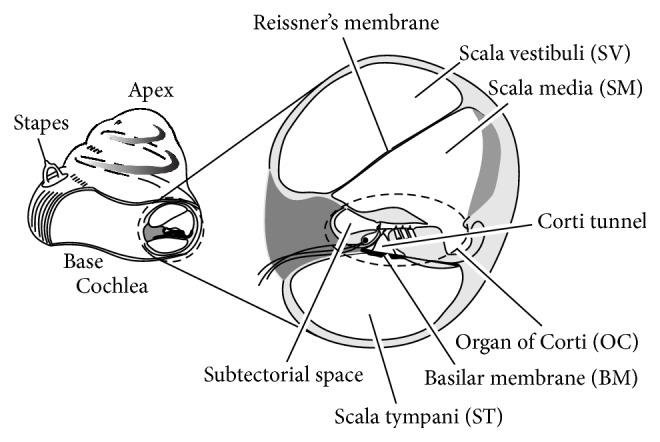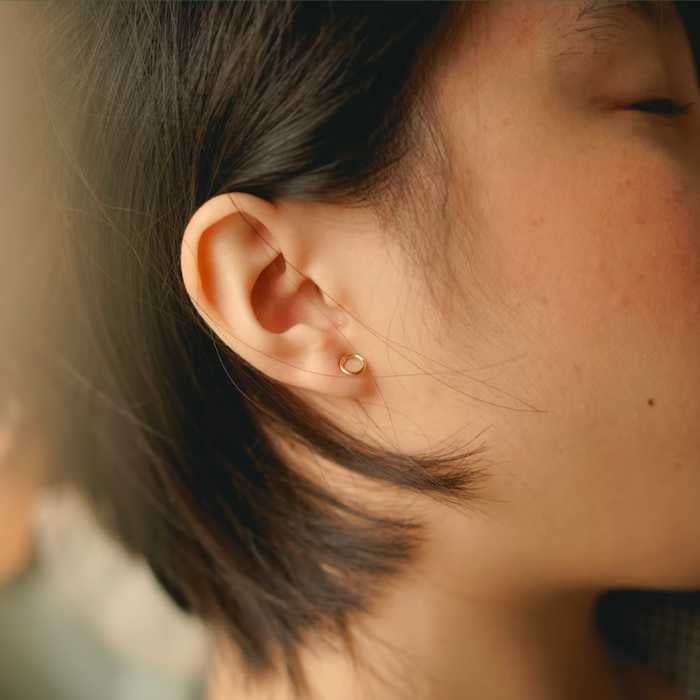Key Takeaways:
- Ménière's disease is characterized by episodes of vertigo, worsening hearing loss, and tinnitus.
- A comprehensive hearing and vestibular evaluation is essential for proper diagnosis of Ménière's.
- Sodium restriction is a common part of symptom management.
- Addressing hearing loss associated with Ménière's may include cochlear implants, CROS, or traditional hearing aids.

If you have ever experienced vertigo, dizziness, ringing in your ears, or sudden hearing loss, you may have Ménière's (men-YEARs) disease.
Ménière's disease is a disorder of the inner ear that can cause vertigo, fluctuating hearing loss, and ringing in the ears (sometimes called tinnitus).
The symptoms listed above can be a sign of this little-known condition, and while there is no cure for Ménière's disease, there are treatments that can help lessen its impact on your life.
As an audiologist, my work has always revolved around the mission of helping patients navigate the maze of hearing loss. Ménière's disease is a condition that presents a unique set of challenges to both patients and healthcare providers alike. This complex condition is characterized by episodes of vertigo and tinnitus and can often feel like uncharted territory. Assisting patients with Ménière's disease isn't just about applying scientific knowledge, it's about human connection and seeing the world through their eyes.
What is Ménière's disease?
Ménière's disease was first discovered and recorded in 1861 by a French physician named Prosper Ménière. In his clinical work, he discovered that the episodes of dizziness and fluctuating hearing loss associated with what we now know as Ménière's stems from the inner ear.
Before his work, the episodes of vertigo that accompany Ménière's were thought to come from seizures in the brain – and this finding is why the disease is named after him.
Currently, it is estimated that this inner ear disease affects approximately 73 of 100,000 people in the United States – about 600,000 people – and occurs slightly more often in females than in males.
Symptoms of Ménière's disease
The symptoms of Ménière's disease can come on suddenly, but it's more common that they develop over time. Common symptoms include episodes of:
- Vertigo
- Fluctuating hearing loss
- Tinnitus
- Ear fullness
These symptoms tend to come and go over time and can vary from mild to severe. Some people with Ménière's disease only experience occasional episodes, while others have disabling symptoms that interfere with their daily life.
Vertigo
This is a feeling that you or your surroundings are spinning or moving even when there isn't any actual movement. As a result, you could experience balance loss, inability to stand up or speak correctly, and brain fog. Vertigo can be extremely debilitating and can last for minutes to hours.
Hearing loss
Ménière's disease causes hearing fluctuations in the affected ear. During an episode of vertigo, hearing loss typically worsens and the ability to hear clearly in the affected ear may be severely impaired.
Tinnitus
If you’ve ever heard a rushing sound in your ear when there is no external source of the noise, you might have tinnitus. Many sufferers report that it sounds like the ocean or the sound when listening to a seashell at the beach.
Aural fullness
This is a feeling of pressure or fullness in the affected ear.
What are the causes of Ménière's disease?
The exact cause of Ménière's disease is not fully understood, in part because it’s hard to clearly visualize what happens in the inner ear without a microscope or other imaging.
However, it is thought to be related to abnormal fluid pressure in the inner ear. Recent research has also suggested a potential genetic component to this disease.
That said, the working theory of the biochemistry and physiology involved in Ménière's disease is really interesting. The snail-shaped inner ear organ, called the cochlea, is filled with fluid and divided into several sections.
Each section is separated by a divider or membrane. The fluid in each divider has a different chemical makeup, and those sections function a little like a 'battery'. The inner ear environment is dependent on these chemical reactions to function properly and send sound through the auditory pathway up to the brain.

During the onset of Ménière's disease, there is an overproduction of fluid (endolymph) in part of the inner ear, which distorts the surrounding structures in the ear. Also referred to as endolymphatic hydrops, changes to the fluid in the inner ear space disrupt the normal functioning of the membranes, hair cells, and pathways in the inner ear.
The result is the typical conglomerate of symptoms: a worsening in hearing, the onset of room-spinning dizziness, and tinnitus in the affected ear.
Once the imbalance of fluids is reabsorbed or resolves, the symptoms improve. Some people may not experience any symptoms in between episodes.
How is Ménière's disease diagnosed?
There is no single test that can diagnose Ménière's disease. Instead, the diagnosis is made based on a combination of symptoms, medical history, and physical examination.
These are tests that your doctor will use to determine whether you have Ménière's disease.
Hearing
A comprehensive hearing evaluation is a very important piece in this diagnosis. Additionally, hearing will be monitored with audiograms to assess any changes in hearing over time. A comprehensive hearing evaluation gives good information about how hearing, speech clarity, and how other aspects of hearing are affected.
Another type of test, called electrocochleography (ECoG), can measure the electrical activity in the inner ear and how well these impulses from the inner ear and auditory nerve are relayed to the brain.
The results of this test are useful to get a "snapshot" of the inner ear environment and whether any unusual activity is present.
However, the test is admittedly a bit uncomfortable to sit for, as a special probe sits directly on the eardrum to measure these signals.
Balance
There are a variety of ear diseases that can mimic Ménière's disease, such as vestibular migraine, benign paroxysmal positional vertigo, or other ear diseases. Special types of balance testing can rule out other potential causes of dizziness.
Did you know that the eyes are the window to the inner ear? Balance testing will typically involve wearing special goggles while sitting or lying in certain positions.
Then, a caloric test will involve cool or warm air in the ear for short periods. The results of this test will show whether any inner ear balance deficits are present in the affected ear.
Other Tests
When hearing in one ear is significantly different than in the other ear, additional tests such as an MRI or CT scan may be ordered to rule out other possible causes of the symptoms.
To monitor your symptoms, an ENT physician will ask you to keep a journal of symptoms regarding dizziness, changes in hearing, and tinnitus. This journal can help to understand patterns in the onset of symptoms, which can also help to create more effective treatment.
Treatments for Ménière's disease
There is no cure for Ménière's disease, but there are treatments that can help relieve the symptoms.
Limiting salt intake is one of the most effective methods to provide relief and prevent episodes. The reason for this is that the biochemistry of the fluid in the inner ear is more sensitive to changes in sodium in Ménière's sufferers.
For those with more severe symptoms, there are other additional management strategies. These may include:
- Diuretics: These medications help reduce fluid retention and can be used to treat acute attacks of vertigo.
- Balance therapy: This type of therapy helps train your body to compensate for episodes of vertigo.
Additionally, your physician may have other individualized treatment recommendations, depending on your specific circumstances.
Serious cases of Ménière's disease may even require surgery to relieve pressure in the inner ear or to destroy the structures that are responsible for balance control (the vestibular part of the inner ear).
Surgery is permanent and should only be considered when all other treatment options have failed.
Hearing loss treatment options
Hearing loss associated with Ménière's disease can be complex to treat. Depending on the severity of the hearing loss, your best options may include:
- a traditional prescription hearing aid
- a CROS hearing system
- a cochlear implant
A hearing aid is an option to address the hearing difficulty for Ménière's disease sufferers.
Additionally, it is not uncommon for those with Ménière's disease to experience sensitivity to loud sounds in the affected ear.
Work with your audiologist to find the most comfortable and appropriate solution.
As an audiologist, I've worked with a variety of individuals with Ménière's disease. In some cases, a hearing aid is still useful in the same way that it helps others with sensorineural hearing loss.
For others, their speech understanding may be sufficiently impaired that the hearing aid is only able to provide environmental awareness without clear speech understanding. In this case, a CROS may be a better option.
And for those with more severe hearing loss and impaired speech understanding, a cochlear implant is a better option to bypass the fluctuating hearing mechanism and deliver electrically to the hearing nerve.
Is Ménière's disease serious and does it get better?
Ménière's disease can be a serious condition that interferes with your daily life. In some cases, it can lead to longstanding, permanent hearing loss and balance problems.
However, most people with Ménière's disease eventually experience long periods without symptoms (remission). Some people may even experience complete symptom resolution over time without treatment. Each person has his or her own experience with this illness
What to do if you think you might have Meniere’s disease?
If you think you might have Meniere’s disease, it’s important to see your doctor so they can rule out other possible causes of your symptoms. Early diagnosis and management of Meniere’s disease can allow you to stay healthy and maintain your quality of life.
While there currently is no cure for Meniere’s Disease, fortunately, there are several treatments available that may provide relief from its debilitating symptoms including vertigo, hearing loss, tinnitus, and aural fullness.
If you think you might have Meniere’s Disease it’s important to see your doctor right away to get a diagnosis and discuss your options.
Conclusion
In conclusion, Ménière's disease is a serious and sometimes debilitating condition that affects not only the auditory system, but also has significant impacts on a patient's balance and quality of life. Patients experience symptoms such as vertigo, tinnitus, and, in some cases, a gradual loss of hearing.
As an audiologist, it is of paramount importance to approach each case with a holistic understanding of these impacts, providing care that is not only scientifically sound but also empathetic and patient-centric. This is an ongoing mission in audiology, one that requires continuous research, exploration, and a dedication to better comprehend and manage Ménière's disease.






